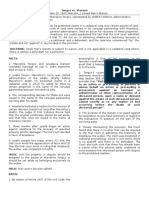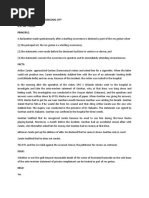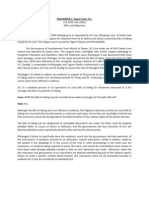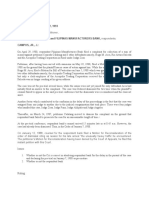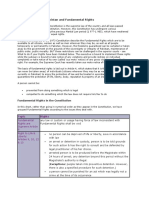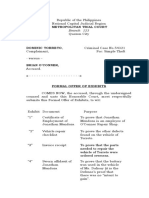People vs. Ner
People vs. Ner
Uploaded by
เจียนคาร์โล การ์เซียCopyright:
Available Formats
People vs. Ner
People vs. Ner
Uploaded by
เจียนคาร์โล การ์เซียOriginal Title
Copyright
Available Formats
Share this document
Did you find this document useful?
Is this content inappropriate?
Copyright:
Available Formats
People vs. Ner
People vs. Ner
Uploaded by
เจียนคาร์โล การ์เซียCopyright:
Available Formats
People vs.
Ner
G.R. No. L-25504 July 31, 1969
FACTS: On May 17, 1964, at about 10:00 p.m., Jose “Boy” de Leon was shot while in his apartment in Sta. Cruz, Manila. He
sustained several wounds in different parts of the body, as a consequence of which, he died soon thereafter. According to
several witnesses for the prosecution Ner, et al. were cruising aboard a red-colored jeep along Anacleto St, and after passing
several times, the jeep made a U-turn and then parked in front of the apartment. Lopena alighted from the jeep and talked
with someone seated on a bench, whereas Ner, followed by Villanueva, entered said building. Soon there was a volley of shots
in Boy's apartment, after which Ner emerged hurriedly from the building, holding a firearm, which he threw into the back of
the jeep. He blew its horn twice, and, forthwith starting the motor, drove off alone. Then Angelina Viray, Boy's common-law
wife rushed out of the apartment shouting several times "Binaril si Boy ni Pirate; binaril si Boy" Thereafter, the lieutenant, Boy’s
uncle, and followed by another witness, Rosales, came running towards the apartment. The lieutenant held Boy's head and
asked him who had shot him. Boy opened his eyes and, with a trembling voice, replied: "Pirate" or "Bobby Pirate". The
lieutenant further inquired: "What Bobby? What Pirate?" But boy no longer answered.
In response to a call, patrolman Artemio Tiong, who would later become one of the witnesses, reached Boy's apartment at
about 10:09 p.m., but he (Boy) was then already gone. Tiong, however, asked Angelina Viray what had happened and she said
that Boy lived with her in the apartment, she being his wife; that between 9:50 and 10:00 o'clock that evening, Pirate Bobby
Ner had visited them; that Boy and Ner talked in the living room, after which, Ner left; that, when Boy and Angelina retired to
their bedroom, soon thereafter, somebody knocked at the door; that as Boy opened the same, there was a hail of gunshots;
that rushing out of the bedroom, she saw Boy sprawled on the floor, mortally wounded; and that his assailant was Bobby
Ner alias Pirate.
ISSUE: Whether or not the testimony of Patrolman Tiong, relative to the statements made to him by Angelina Viray,
notwithstanding the fact that she had not been placed on the witness stand admissible as evidence in court.
RULING: YES. The defense insists that the testimony of Patrolman Tiong concerning his conversation with Angelina Viray
should be disregarded as hearsay, for Angelina did not take the witness stand. Said conversation took place in Boy's apartment,
on May 17, 1964, between 10:09 and 10:30 p.m., or immediately after the occurrence, and referred to the circumstances
surrounding the same. At that time, Angelina had not, as yet, fully recovered from the effects of the assassination of her
common-law husband, practically, if not actually, before her own eyes. In fact, she was not only crying; she had, also, been
repeatedly saying, almost hysterically, that Boy had been shot by "Pirate". Tiong's testimony about the statements then made
by her, before she could have deliberated on the events that had transpired a few minutes before, was properly admitted
under Sec. 36 of Rule 130 of the Rules of Court, pursuant to which:
... Statements made by a person while a startling occurrence is taking place or immediately
prior or subsequent thereto with respect to the circumstances thereof, may be given in evidence as a part
of the RES GESTAE. …
Indeed, it has been held that declarations which are the natural emanations or outgrowths of the act or occurrence in
litigation, although not precisely concurrent in point of time, if they were yet voluntarily and spontaneously made so nearly
contemporaneous as to be in the presence of the transaction which they illustrate and explain, and were made under such
circumstances as necessarily to exclude the idea of design or deliberation, must, upon the clearest principles of justice, be
admissible as part of the act or transaction itself.
It is true that, in saying that Boy had been shot by Pirate, Angelina did not explain to Patrolman Tiong whether or not she had
seen the latter in the act of firing, although she said so in an affidavit made by her in the City Fiscal's office. Her story to
Patrolman Tiong indicated, however, that she had seen appellant and Boy talking in the living room of his apartment, shortly
before the shooting, and that, accordingly, she had personal knowledge of appellant's presence at the scene of the occurrence.
The fact that Angelina's statement to Tiong was part of her narration, prompted by his questions about the details of the
occurrence, does not detract from the spontaneity of her statement. All that is required for the admissibility of a given
statement as part of the res gestae, is that it be made under the influence of a startling event witnessed by the person who
made the declaration before he had time to think and make up a story , or to concoct or contrive a falsehood, or to fabricate an
account, and without any undue influence in obtaining it, aside from referring to the event in question or its immediate
attending circumstances.
Similarly, the following statements have been held to be part of the res gestae: the statement of a child made within an
hour of an alleged assault; the testimony of a police officer as to what a victim told him not more than 30 minutes after the
commission of an alleged crime; the statements of defendant's employees made about 30 minutes after an accident; and the
declaration of a victim some 5 to 10 minutes after an incident.
You might also like
- Torts Flow Chart PDFDocument6 pagesTorts Flow Chart PDFDanielleH.Morrison100% (3)
- ACC4216Document8 pagesACC4216jiaqi engNo ratings yet
- Marino v. Gil Y. GamillaDocument7 pagesMarino v. Gil Y. GamillaEmir MendozaNo ratings yet
- People v. PangilinanDocument1 pagePeople v. PangilinanMACNo ratings yet
- Batch 4 Digest - Alvarez To Blue CrossDocument14 pagesBatch 4 Digest - Alvarez To Blue CrossjamesonuyNo ratings yet
- Evid 5Document18 pagesEvid 5Mico LrzNo ratings yet
- People V Lo Ho WingDocument2 pagesPeople V Lo Ho WingJade HernandezNo ratings yet
- People of The Philippines vs. Danny GodoyDocument7 pagesPeople of The Philippines vs. Danny GodoyDales BatoctoyNo ratings yet
- G.R. Nos. 138195-96 July 10, 2003 - PEOPLE OF THE PHIL. v. NICANOR ROA - July 2003 - Philipppine Supreme Court DecisionsDocument27 pagesG.R. Nos. 138195-96 July 10, 2003 - PEOPLE OF THE PHIL. v. NICANOR ROA - July 2003 - Philipppine Supreme Court DecisionsJoses Nino Aguilar0% (1)
- G.R. No. 199877 August 13, 2012 PEOPLE OF THE PHILIPPINES, Plaintiff-Appellee, ARTURO LARA y ORBISTA, Accused-AppellantDocument10 pagesG.R. No. 199877 August 13, 2012 PEOPLE OF THE PHILIPPINES, Plaintiff-Appellee, ARTURO LARA y ORBISTA, Accused-AppellantBUTTERFLYNo ratings yet
- People Vs AlcoberDocument2 pagesPeople Vs AlcobertinctNo ratings yet
- Estate of Ong vs. DiazDocument17 pagesEstate of Ong vs. DiazAji AmanNo ratings yet
- Remedial Law Review Case Digest Topic Case Title GR NO. G.R. No. 118438 DATE: December 4, 1998 DoctrineDocument1 pageRemedial Law Review Case Digest Topic Case Title GR NO. G.R. No. 118438 DATE: December 4, 1998 DoctrineKLNo ratings yet
- Onde v. Civil RegistrarDocument2 pagesOnde v. Civil Registrarkim_santos_20No ratings yet
- 114020-2002-People v. NorrudinDocument14 pages114020-2002-People v. NorrudinMau AntallanNo ratings yet
- Torts and Damages Case Digest Mar.3Document23 pagesTorts and Damages Case Digest Mar.3Van NessaNo ratings yet
- 15 - Tongco vs. VianzonDocument1 page15 - Tongco vs. VianzonRuth LumibaoNo ratings yet
- Case #16: GSIS V Heirs of Caballero, G.R. Nos. 158090, October 4, 2010Document3 pagesCase #16: GSIS V Heirs of Caballero, G.R. Nos. 158090, October 4, 2010Mythel SolisNo ratings yet
- Arthur Zarate Vs RTCDocument2 pagesArthur Zarate Vs RTCJigo DacuaNo ratings yet
- Heirs of Lagutan vs. Severina Icao DIGESTDocument2 pagesHeirs of Lagutan vs. Severina Icao DIGESTFairyssa Bianca SagotNo ratings yet
- Topic: Testimonial Evidence 1. Qualification of Witnesses, Rule 130, Section 21Document2 pagesTopic: Testimonial Evidence 1. Qualification of Witnesses, Rule 130, Section 21Tootsie GuzmaNo ratings yet
- People vs. JaurigueDocument2 pagesPeople vs. JaurigueDianne Bernadeth Cos-agonNo ratings yet
- 14 23 B People Vs TeehankeeDocument6 pages14 23 B People Vs TeehankeeAAMCNo ratings yet
- SUSAN LIM-LUA Vs DANILO Y. LUADocument1 pageSUSAN LIM-LUA Vs DANILO Y. LUAParis ValenciaNo ratings yet
- PHILAMGEN - Vda de Onate DigestDocument3 pagesPHILAMGEN - Vda de Onate Digestjudith_marie1012No ratings yet
- Tongco V Vianzon (Dead Man's Statute)Document1 pageTongco V Vianzon (Dead Man's Statute)Carlo Ilano100% (1)
- PEOPLE OF THE PHILIPPINES, Plaintiff-Appellee, Vs - EUTIQUIA CARMEN, Celedonia Fabie, Delia Sibonga, Alexander Sibonga, Reynario NuezDocument5 pagesPEOPLE OF THE PHILIPPINES, Plaintiff-Appellee, Vs - EUTIQUIA CARMEN, Celedonia Fabie, Delia Sibonga, Alexander Sibonga, Reynario NuezPearl Anne GumaposNo ratings yet
- Vda. de Bataclan vs. Medina, 102 Phil. 181 (1957) FactsDocument2 pagesVda. de Bataclan vs. Medina, 102 Phil. 181 (1957) FactsJuly BacarNo ratings yet
- People Vs AdilDocument2 pagesPeople Vs AdilNiala AlmarioNo ratings yet
- Assignment No 7.1Document37 pagesAssignment No 7.1rollanekimNo ratings yet
- Calalang Vs CADocument2 pagesCalalang Vs CAAnn Alejo-Dela TorreNo ratings yet
- Republic v. Marcos-ManotocDocument5 pagesRepublic v. Marcos-ManotocMarinella DonorNo ratings yet
- People v. Franco, 269 SCRA 211 91997)Document6 pagesPeople v. Franco, 269 SCRA 211 91997)GioNo ratings yet
- David vs. Arroyo DigestDocument4 pagesDavid vs. Arroyo DigestMelvin PernezNo ratings yet
- Calalang vs. CA, 217 SCRA 462 G.R. No. 103185 January 22, 1993Document2 pagesCalalang vs. CA, 217 SCRA 462 G.R. No. 103185 January 22, 1993Caleb Josh PacanaNo ratings yet
- Boston vs. CA G.R. No. 173946, June 19, 2013 Perez, JDocument2 pagesBoston vs. CA G.R. No. 173946, June 19, 2013 Perez, JwupwupwupNo ratings yet
- Case Digest Case No. 5 Case No. 6Document3 pagesCase Digest Case No. 5 Case No. 6carl fuerzasNo ratings yet
- 2006 Bir - Ruling - Da 745 06 - 20180405 1159 SdfparDocument3 pages2006 Bir - Ruling - Da 745 06 - 20180405 1159 Sdfpar--No ratings yet
- Herrera-Felix v. CADocument2 pagesHerrera-Felix v. CAIris GallardoNo ratings yet
- People v. CarlosDocument3 pagesPeople v. CarlosjrvyeeNo ratings yet
- JULIAN YAP Vs SANTIAGO TANADADocument2 pagesJULIAN YAP Vs SANTIAGO TANADAGale Charm SeñerezNo ratings yet
- 05 Eagle Ridge V CameronDocument1 page05 Eagle Ridge V CameronBasil MaguigadNo ratings yet
- 31 Manganey v. SandiganbayanDocument3 pages31 Manganey v. SandiganbayanKenny EspiNo ratings yet
- Abardo vs. Sandiganbayan 335 SCRA 341Document18 pagesAbardo vs. Sandiganbayan 335 SCRA 341Joe PoNo ratings yet
- Cleofas vs. St. Peter FinalDocument3 pagesCleofas vs. St. Peter Finalandrew estimoNo ratings yet
- ACDC v. TulabutDocument1 pageACDC v. TulabutCy PanganibanNo ratings yet
- People vs. IgnasDocument2 pagesPeople vs. IgnasCatherine Dawn MaunesNo ratings yet
- Mendoza v. Officers of MWEUDocument2 pagesMendoza v. Officers of MWEUFrancis PunoNo ratings yet
- People vs. ManaloDocument1 pagePeople vs. ManaloPaul John Santiago TucayNo ratings yet
- Salvanera vs. PeopleDocument10 pagesSalvanera vs. PeopleHyacinthNo ratings yet
- People Vs CastilloDocument2 pagesPeople Vs CastilloNiknik CaguironNo ratings yet
- Heirs of Gevero v. Guihing Agricultural & Development Corp., G.R. No. 122619 PDFDocument7 pagesHeirs of Gevero v. Guihing Agricultural & Development Corp., G.R. No. 122619 PDFJohzzyluck R. MaghuyopNo ratings yet
- ULPIANO BALO, Et Al. vs. CADocument2 pagesULPIANO BALO, Et Al. vs. CAKaye MendozaNo ratings yet
- People v. LungayanDocument2 pagesPeople v. LungayanadeeNo ratings yet
- 234395-2019-People v. Orcullo y SusaDocument11 pages234395-2019-People v. Orcullo y SusaAdrian Jeremiah VargasNo ratings yet
- Rudecon MGT Corp V Camacho 437 Scra 202Document4 pagesRudecon MGT Corp V Camacho 437 Scra 202emdi19No ratings yet
- Beduya V RPDocument2 pagesBeduya V RPLucyNo ratings yet
- 007 Magdayao Vs PeopleDocument3 pages007 Magdayao Vs PeopleJerome MoradaNo ratings yet
- Abad, J.: Ang v. Court of Appeals (GR No. 182835)Document2 pagesAbad, J.: Ang v. Court of Appeals (GR No. 182835)Dave UmeranNo ratings yet
- People v. Butler PDFDocument46 pagesPeople v. Butler PDFbernadette pedroNo ratings yet
- 78 SARI-SARI GROUP Vs PIGLAS KAMAODocument2 pages78 SARI-SARI GROUP Vs PIGLAS KAMAODavid Antonio A. EscuetaNo ratings yet
- People V Ner Digest For EvidenceDocument4 pagesPeople V Ner Digest For EvidencechaynagirlNo ratings yet
- Celestino Marturillas vs. People of The PhilippinesDocument3 pagesCelestino Marturillas vs. People of The PhilippinesIriel PepitoNo ratings yet
- Sample AcknowledgmentDocument1 pageSample Acknowledgmentเจียนคาร์โล การ์เซียNo ratings yet
- Extrajudicial Settlement of Estate With Absolute Sale SampleDocument4 pagesExtrajudicial Settlement of Estate With Absolute Sale Sampleเจียนคาร์โล การ์เซียNo ratings yet
- Case DigestDocument3 pagesCase Digestเจียนคาร์โล การ์เซียNo ratings yet
- 08-24-2020 Full Text CasesDocument70 pages08-24-2020 Full Text Casesเจียนคาร์โล การ์เซียNo ratings yet
- Litton Mills Employees V Ferrer Calleja DigestDocument4 pagesLitton Mills Employees V Ferrer Calleja Digestเจียนคาร์โล การ์เซียNo ratings yet
- LARENA Vda. DE VILLANUEVA vs. CAPISTRANODocument2 pagesLARENA Vda. DE VILLANUEVA vs. CAPISTRANOเจียนคาร์โล การ์เซียNo ratings yet
- 100 Bascon VS Ca DigestDocument4 pages100 Bascon VS Ca Digestเจียนคาร์โล การ์เซียNo ratings yet
- CENECO Vs Sec of DOLE MATDocument1 pageCENECO Vs Sec of DOLE MATเจียนคาร์โล การ์เซียNo ratings yet
- Unfair Labor Practices (Art 248-249) : Labor Relations Case Digests - Set 4Document11 pagesUnfair Labor Practices (Art 248-249) : Labor Relations Case Digests - Set 4เจียนคาร์โล การ์เซียNo ratings yet
- (PDF) St. Scholastica' S College vs. Torres, G.R. No. 100158, June 29, 1992Document6 pages(PDF) St. Scholastica' S College vs. Torres, G.R. No. 100158, June 29, 1992เจียนคาร์โล การ์เซียNo ratings yet
- NATU Vs TorresDocument2 pagesNATU Vs Torresเจียนคาร์โล การ์เซียNo ratings yet
- Articles of Partnership - SampleDocument4 pagesArticles of Partnership - Sampleเจียนคาร์โล การ์เซียNo ratings yet
- Corpo April 2 Full Text CasesDocument76 pagesCorpo April 2 Full Text Casesเจียนคาร์โล การ์เซียNo ratings yet
- Commercial Law Lecture 07-05-2019 PDFDocument12 pagesCommercial Law Lecture 07-05-2019 PDFเจียนคาร์โล การ์เซียNo ratings yet
- Corp Law Doctrinal Rulings Part 3 05-05-2020Document1 pageCorp Law Doctrinal Rulings Part 3 05-05-2020เจียนคาร์โล การ์เซียNo ratings yet
- Renumbered. Syllabus LABOR RELATIONS 2020Document14 pagesRenumbered. Syllabus LABOR RELATIONS 2020เจียนคาร์โล การ์เซียNo ratings yet
- Petitioner vs. vs. Respondent: Second DivisionDocument11 pagesPetitioner vs. vs. Respondent: Second Divisionเจียนคาร์โล การ์เซียNo ratings yet
- Buenaflor vs. Camarines Sur Industry Corp.Document2 pagesBuenaflor vs. Camarines Sur Industry Corp.เจียนคาร์โล การ์เซียNo ratings yet
- People vs. Salison Jr.Document25 pagesPeople vs. Salison Jr.เจียนคาร์โล การ์เซียNo ratings yet
- Demurrer To OAG Petition For Writ of Quo WarrantoDocument5 pagesDemurrer To OAG Petition For Writ of Quo WarrantoJames Renwick Manship, Sr.100% (2)
- Estafa Cases 2Document64 pagesEstafa Cases 2Leoni Francis Lagrama100% (1)
- Rufino v. Endriga, G.R. No. 139554, July 21, 2006 HI-LITEDocument15 pagesRufino v. Endriga, G.R. No. 139554, July 21, 2006 HI-LITEEmil BautistaNo ratings yet
- Harvard Guide To Using Sources: How To Avoid Plagiarism, April 4, 2015, Available atDocument13 pagesHarvard Guide To Using Sources: How To Avoid Plagiarism, April 4, 2015, Available atfrsfwtetNo ratings yet
- Buried BodiesDocument2 pagesBuried BodiesNeil Ian S. OchoaNo ratings yet
- Ap 1Document9 pagesAp 1RaviKiran AvulaNo ratings yet
- The Constitution of Pakistan and Fundamental RightsDocument4 pagesThe Constitution of Pakistan and Fundamental RightsSaqi BhattiNo ratings yet
- Plato's Theory of JusticeDocument12 pagesPlato's Theory of JusticeNidhi HiranwarNo ratings yet
- Family LawDocument11 pagesFamily LawAnonymous Bx2xKIINo ratings yet
- Best Evidence Rule and Parol EvidenceDocument4 pagesBest Evidence Rule and Parol EvidenceMark Dungo100% (3)
- Sworn Affidavit of Service by MessengerDocument4 pagesSworn Affidavit of Service by Messengerjasmin coNo ratings yet
- WK 2 ETH 101Document6 pagesWK 2 ETH 101ANGELICA AGUNODNo ratings yet
- Ladera Vs Hodges Digest (By Others)Document1 pageLadera Vs Hodges Digest (By Others)ac franciscoNo ratings yet
- Plaintiff-Appellee Vs Vs Defendant-Appellant Solicitor General Ambrosio Padilla Assistant Solicitor General Esmeraldo Umali Bonifacio CandoDocument5 pagesPlaintiff-Appellee Vs Vs Defendant-Appellant Solicitor General Ambrosio Padilla Assistant Solicitor General Esmeraldo Umali Bonifacio CandoChristine Joy PamaNo ratings yet
- Draculan vs. DonatoDocument9 pagesDraculan vs. DonatoisaaabelrfNo ratings yet
- Elvira T. Arangote, G.R. No. 178906Document8 pagesElvira T. Arangote, G.R. No. 178906Ricky James SuyuNo ratings yet
- Dishonour of Negotiable InstrumentDocument10 pagesDishonour of Negotiable InstrumentHyderNo ratings yet
- Notes.: Petition Denied, Judgment and Resolution AffirmedDocument17 pagesNotes.: Petition Denied, Judgment and Resolution AffirmederforNo ratings yet
- Discharge of Duty Into The Private Rented SectorDocument8 pagesDischarge of Duty Into The Private Rented SectorDan MitchellNo ratings yet
- Metropolitan Trial Court: Branch 123Document3 pagesMetropolitan Trial Court: Branch 123Rheyne Robledo-MendozaNo ratings yet
- Judicial Affidavit DefendantDocument4 pagesJudicial Affidavit DefendantKesTerJeeeNo ratings yet
- IOCL Application Form PDFDocument11 pagesIOCL Application Form PDFअसीम मेहता100% (1)
- Birchall Statement Regarding Rankins'Motion To Vacate Feb 3 2014Document10 pagesBirchall Statement Regarding Rankins'Motion To Vacate Feb 3 2014Patrick JohnsonNo ratings yet
- Las Q3 Science 3 Week 1Document8 pagesLas Q3 Science 3 Week 1Apple Joy LamperaNo ratings yet
- Fernando Vs Court of AppealsDocument1 pageFernando Vs Court of AppealsDianne ComonNo ratings yet
- Notice of Hearing and Motion For Relief From Stay Lenny FrolovDocument8 pagesNotice of Hearing and Motion For Relief From Stay Lenny FrolovCamdenCanaryNo ratings yet
- United States v. Andrew Owens, 4th Cir. (2015)Document5 pagesUnited States v. Andrew Owens, 4th Cir. (2015)Scribd Government DocsNo ratings yet
















